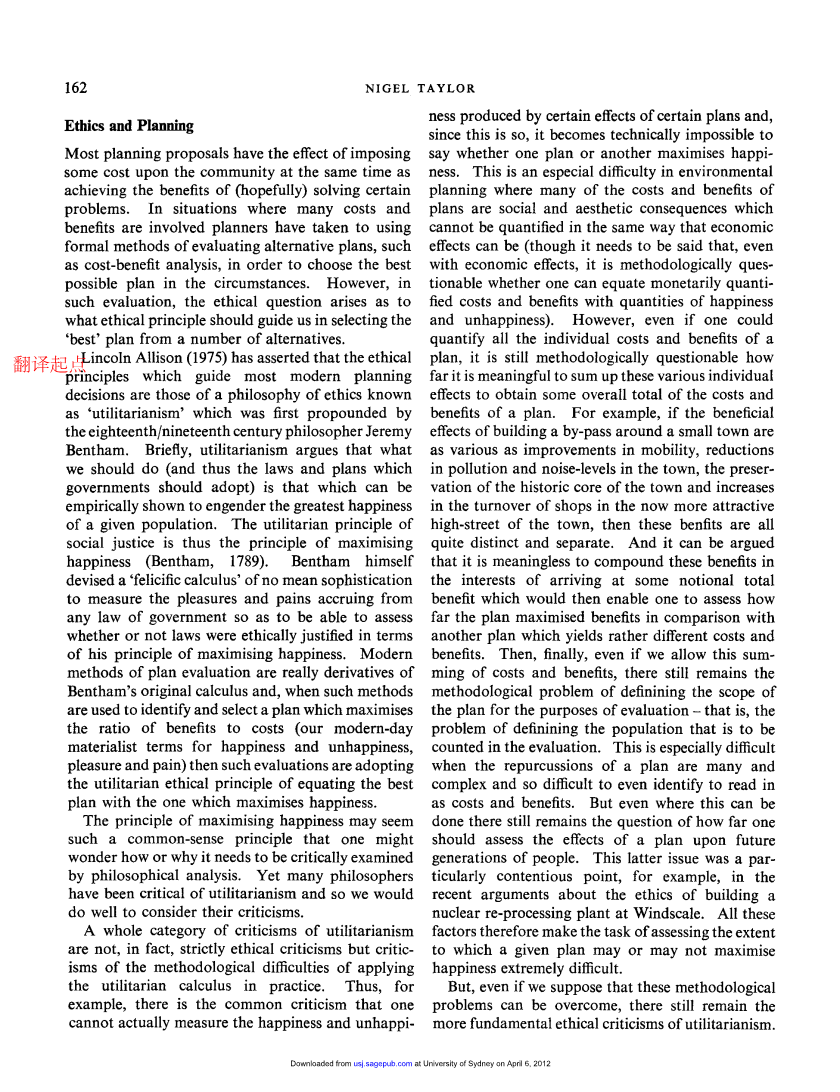英语原文共 6 页
incoln Allison (1975) has asserted that the ethical
principles which guide most modern planning decisions are those of a philosophy of ethics known as lsquo;utilitarianism rsquo; which was first propounded by
the eighteenth/nineteenth century philosopher Jeremy Bentham. Briefly, utilitarianism argues that what we should do (and thus the laws and plans which governments should adopt) is that which can be empirically shown to engender the greatest happiness of a given population. The utilitarian principle of social justice is thus the principle of maximising happiness (Bentham, 1789). Bentham himself devised a lsquo;felicific calculus#39; of no mean sophistication to measure the pleasures and pains accruing from any law of government so as to be able to assess whether or not laws were ethically justified in terms of his principle of maximising happiness. Modern methods of plan evaluation are really derivatives of Benthamrsquo;s original calculus and, when such methods
are used to identify and select a plan which maximises the ratio of benefits to costs (our modern-day materialist terms for happiness and unhappiness, pleasure and pain) then such evaluations are adopting the utilitarian ethical principle of equating the best plan with the one which maximises happiness.
The principle of maximising happiness may seem such a common-sense principle that one might wonder how or why it needs to be critically examined by philosophical analysis. Yet many philosophers have been critical of utilitarianism and so we would do well to consider their criticisms.
A whole category of criticisms of utilitarianism are not, in fact, strictly ethical criticisms but criticshy; isms of the methodological difficulties of applying the utilitarian calculus in practic在. Thus, for example, there is the common criticism that one cannot actually measure the happiness and unhappi-
incoln Allison(1975)断言道德指导大多数现代规划决策的原则是被称为“功利主义”的道德哲学的原则十八/十九世纪的哲学家杰里米·边沁。简而言之,功利主义认为,我们应该做的事情(以及政府应该采用的法律和计划)是可以凭经验证明能够产生特定人口最大幸福的事物。因此,社会正义的功利原则是最大化的原则幸福(Bentham,1789)。边沁本人设计了一种“复杂的微积分”,无法衡量任何政府法律所带来的快乐和痛苦,以便能够根据他的幸福最大化原则来评估法律在道德上是否合理。现代的计划评估方法实际上是衍生品边沁的原始微积分,当这样的方法用于识别和选择一个最大化利益与成本比率的计划(我们现代唯物主义的幸福和不幸,快乐和痛苦的术语)然后这样的评估采用功利主义的道德原则,将最佳计划等同于最大化幸福。
最大化幸福的原则可能看起来是一种常识性原则,人们可能想知道它需要如何或为什么需要通过哲学分析进行批判性检验。然而,许多哲学家一直批评功利主义,所以我们最好考虑他们的批评。
事实上,对功利主义的一整类批评并不是严格的伦理批评,而是在实践中应用功利主义微积分的方法论困难的批评主义。因此,例如,有一种共同的批评,即人们实际上无法衡量幸福和不幸
ness produced by certain effects of certain plans and, since this is so, it becomes technically impossible to say whether one plan or another maximises happishy; ness. This is an especial difficulty in environmental planning where many of the costs and benefits of plans are social and aesthetic consequences which cannot be quantified in the same way that economic effects can be (though it needs to be said that, even with economic effects, it is methodologically quesshy; tionable whether one can equate monetarily quantishy; fied costs and benefits with quantities of happiness and unhappiness). However, even if one could quantify all the individual costs and benefits of a plan, it is still methodologically questionable how far it is meaningful to sum up these various individual effects to obtain some overall total of the costs and benefits of a plan. For example, if the beneficial effects of building a by-pass around a small town are as various as improvements in mobility, reductions in pollution and noise-levels in the town, the presershy; vation of the historic core of the town and increases in the turnover of shops in the now more attractive high-street of the town, then these benfits are all quite distinct and separate. And it can be argued that it is meaningless to compound these benefits in the interests of arriving at some notional total benefit which would then enable one to assess how far the plan maximised benefits in comparison with another plan which yields rather different costs and benefits. Then, finally, even if we allow this sumshy; ming of costs and benefits, there still remains the methodological problem of definining the scope of the plan for the purposes of evaluation - that is, the problem of definining the population that is to be counted in the evaluation. This is especially difficult when the repurcussions of a plan are many and complex and so difficult to even identify to read in as costs and benefits. But even where this can be done there still remains the question of how far one should assess the effects of a plan upon future generations of people. This latter issue was a parshy; ticularly contentious point, for example, in the recent arguments about the ethics of building a nuclear re-processing plant at Windscale. All these factors therefore make the task of assessing the extent to which a given plan may or may not maximise happiness extremely difficult.
But, even if we suppose that these methodological problems can be overcome, there still remain the more fundamental ethical criticisms of utilitarianism.
某些计划的某些影响所产生的,并且由于这样,从技术上说,一个计划或另一个计划是否最大化了幸福感。这是环境规划中的一个特殊困难,其中计划的许多成本和收益都是社会和美学后果,无法用经济效应相同的方式量化(尽管需要说,即使有经济影响,它也是如此)从方法论上来说,是否可以将货币化的成本和收益与幸福和不幸的数量等同起来。然而,即使可以量化计划的所有个人成本和收益,但在方法上仍然有问题的是总结这些不同的个体效应以获得计划的总成本和收益的总体意义。例如,如果在小城镇周围建造旁路的有益效果与移动性的改善,城镇污染和噪声水平的降低,城镇历史核心的保护以及城镇的增加有关。在现在更具吸引力的高街上的商店营业额,那么这些好处都是截然不同的。可以认为,为了达到一些名义上的总收益,将这些收益复合起来是毫无意义的,这样就可以评估计划与另一个产生相当不同的成本和收益的计划相比最大化收益的程度。然后,最后,即使我们允许这种成本和收益的总和,仍然存在为评估目的而界定计划范围的方法问题 - 即,确定要计入的人口的问题。评价。当计划的重复性很多且复杂且甚至难以确定为成本和收益时,这尤其困难。但即使可以做到这一点,仍然存在一个问题,即应该在多大程度上评估计划对未来几代人的影响。后一个问题是一个特别有争议的问题,例如,最近有关在Windscale建立核再加工厂伦理的论点。因此,所有这些因素使得评估特定计划可能或不可能最大化幸福的程度的任务极其困难。
但是,即使我们认为可以克服这些方法论问题,仍然存在对功利主义的更基本的伦理批评。
One of these is in fact closely tied up with the methodological difficulties described above, since it concerns the issue of weighin up various ethical values in terms of their relative contributions to happiness. The problem is that all values become relative to each other in relation to the utilitarian
以上是毕业论文外文翻译,课题毕业论文、任务书、文献综述、开题报告、程序设计、图纸设计等资料可联系客服协助查找。




